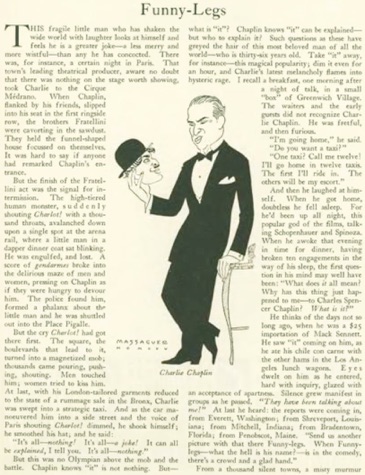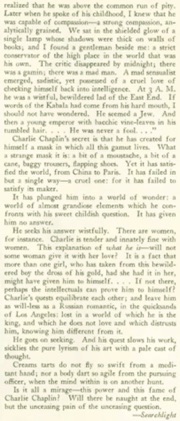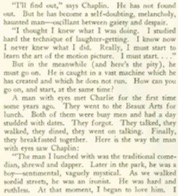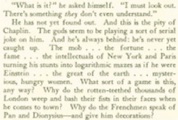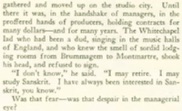The Gold Rush 1923 1924 1926 next previous
The Gold Rush Clippings 160/363
New Yorker, New York, May 23, 1925.
The Gold Rush Scene
(...) Exhibitors Trade Review, June 6, 1925
& Being Funny is serious business
to Charles Spencer Chaplin whose Gold Rush has been
completed for United Artists.
(...) Exhibitors Trade Review, June 6, 1925
„A greater joke“
Editorial content. „PROFILES
Funny-Legs
Cartoon by Conrado W. Massaguer. Charlie Chaplin
THIS fragile little man who has shaken the wide
world with laughter looks at himself and feels
he is a greater joke – a less merry and more wistful – than any
he has concocted. There was, for instance, a certain
night in Paris. That town‘s leading theatrical producer, aware
no doubt that there was nothing on the stage worth
showing, took Charlie to the Cirque Médrano. When Chaplin,
flanked by his friends, slipped into his seat in the
first ringside row, the brothers Fratellini were cavorting in the
sawdust. They held the funnel-shaped house focussed
on themselves. It was hard to say if anyone had remarked
Chaplin‘s entrance.
But the finish of the Fratellini act was the signal for
intermission. The high-tiered human monster,
suddenly shouting Charlot! with a thousand throats,
avalanched down upon a single spot at the
arena rail, where a little man in a dapper dinner coat sat
blinking. He was engulfed, and lost. A score
of gendarmes broke into the delirious maze of men and women,
pressing on Chaplin as if they were hungry to devour
him. The police found him, formed a phalanx about the little
man and he was shuttled out into the Place Pigalle.
But the cry Charlot! had got there first. The square,
the boulevards, that lead to it, turned into
a magnetized mob; thousands came pouring, pushing,
shouting. Men touched him; women tried to kiss
him. At last, with his London-tailored garments reduced
to the state of a rummage sale in the Bronx,
Charlie was swept into a strategic taxi. And as the car
manoeuvered him into a side street and the voice
of Paris shouting Charlot! dimmed, he shook himself;
he smoothed his hat: and he said:
,It‘s all – nothing! It‘s all – a joke! It can all be explained,
I tell you. It‘s all – nothing.‘
But this was no Olympian above the mob and the
battle. Chaplin knows ,it‘ is not nothing. But –
what is ,it‘? Chaplin knows ,it‘ can be explained – but who
to explain it? Such questions as these have greyed
the hair of this most beloved man of all the world – who
is thirty-six years old. Take ,it‘ away, for instance –
this magical popularity; dim it even for an hour, and Charlie‘s
latest melancholy flames into hysteric rage. I recall
a breakfast, one morning after a night of talk, in a small
,box‘ of Greenwich Village. The waiters and the
early guests did not recognize Charlie Chaplin. He was
fretful, and then furious.
,I‘m going home,‘ he said.
,Do you want a taxi?‘
,One taxi? Call me twelve! I‘ll go home in twelve taxis.
The first I‘ll ride in. The others will be my escort.‘
And then he laughed at himself. When he got home,
doubtless he fell asleep. For he‘d been up all
night, this popular god of the films, talking Schopenhauer
and Spinoza. When he awoke that evening in time
for dinner, having broken ten engagements in the way of his
sleep, the first question in his mind may well have
been: ,What does it all mean? Why has this thing just happened
to me – to Charles Spencer Chaplin? What is it?‘
He thinks of the days not so long ago, when he was
a $25 importation of Mack Sennett. He saw ,it‘
coming on him, as he ate his chile con carne with the other
hams in the Los Angeles lunch wagons. Eyes
dwelt on him as he entered, hard with inquiry, glazed
with an acceptance of apartness. ,They have
been talking about me!‘ At last he heard: the reports were
coming in, from Everett, Washington; from Shreveport,
Louisiana; from Mitchell, Indiana; from Bradentwon, Florida;
from Penobscot, Maine. ,Send us another picture
with that there Funny-legs. When Funny-legs – what the hell
is his name? – is in the comedy, there‘s a crowd
and a glad hand.‘
From a thousand silent towns, a misty murmur
gathered and moved up on the studio city.
Until there it was, in the handshake of managers, in the
proffered hands of producers, holding contracts
for many dollars – and for many years. The Whitechapel lad
who had been a dud, singing in the music halls
of England, and who knew the smell of sordid lodging rooms
from Brummagem to Montmartre, shook his head,
and refused to sign.
,I don‘t know,‘ he said. ,I may retire. I may study Sanskrit.
I have always been interested in Sanskrit, you know.‘
Was that fear – was that despair in the managerial eye?
,What is it?‘ he asked himself. ,I must look out.
There‘s something they don‘t even understand.‘
He has not yet found out. And this is the pity of Chaplin.
The gods seem to be playing a sort of serial joke
on him. And he‘s always behind: he‘s never yet caught up.
The mob... the fortune... the fame... the intellectuals
of New York and Paris turning his stunts into logarithmic mazes
as if he were Einstein... the great of the earth...
mysterious, hungry women. What sort of a game is this,
any way? Why do the rotten-teethed thousands
of London weep and bash their fists in their faces when he comes
to town? Why do the Frenchmen speak of Pan and
Dionysius – and give him decorations?
,I‘ll find out,‘ says Chaplin. He has not found out.
But he has become a self-doubting, melancholy,
haunted man – oscillant between gaiety and despair.
,I thought I knew what I was doing. i studied
hard the technique of laughter-getting. I know now I never
knew what I did. Really, I must start to learn the art
of the motion picture. I must start....‘
But in the meanwhile (and here‘s the pity), he must
go on. He is caught in a vast machine which
he has created and which he does not run. How can you
go on, and start, at the same time?
A man with eyes met Charlie for the first time some years
ago. They went to the Beaux Arts for lunch. Both
of them were busy men and had a day studded with dates.
They forgot. They talked, they walked, they dined,
they went on talking. Finally, they breakfasted together.
Here is the way the man with eyes saw Chaplin.
,The man I lunched with was the traditional comedian,
shrewd and dapper. Later in the park, he was a boy
– sentimental, vaguely mystical. As we walked sordid streets,
he was an ironist. He was hard and ruthless.
At that moment, I began to love him. I realized that he was
above the common run of pity. Later when he spoke
of his childhood, I knew that he was capable of compassion
– a strong compassion, analytically grained. We sat
in the shielded glow of a single lamp whose shadows were
thick on walls of books; and I found a gentleman
beside me: a strict conservator of the high place in the world
that was his own. The critic disappeared by midnight;
there was a gamin; there was a mad man. A mad sensualist
emerged, sadistic, yet possessed of a cruel love
of checking himself back into intelligence. At 3 A. M. he was
a wistful, bewildered lad of the East End. If words
of the Kabala had come from his hard mouth, I should not
have wondered. He seemed a Jew. And then
a young emperor with bacchic vine-leaves in his tumbled
hair.... He was never a fool....‘
Charlie Chaplin‘s secret is that he has created for
himself a mask in which all this gamut lives.
What a strange mask it is: a bit of a moustache, a bit of a cane,
baggy trousers, flapping shoes. Yet it has satisfied
the world, from China to Paris. It has failed in but a single way
– a cruel one: for it has failed to satisfy its maker.
It has plunged him into a world of wonder: a world
of almost grandiose elements which he confronts
with his sweet childish question. It has given him no answer.
He seeks his answer wistfully. There are women,
for instance. Charlie is tender and innately fine with women.
This explanation of what he is – will not some woman
give it with her love? It is a fact that more than one girl, who
has taken from this bewildered boy the dross of his
gold, had she had it in her, might have given him to himself....
If not there, perhaps the intellectuals can prove
him to himself? Charlie‘s quests equilibrate each other;
and leave him as will-less as a Russian romantic,
in the quicksands of Los Angeles; lost in a world of which
he is the king, and which he does not love
and which distrusts him, knowing him different from it.
He goes on seeking. And his quest slows his
work, sicklies the pure lyrism of his art with a pale cast
of thought.
Cream tarts do not fly so swift from a meditant
hand, nor a body dart so agile from the pursuing officer,
when the mind within is on another hunt.
Is it all a mirage – this power and this fame of Charlie
Chaplin? Will there be naught at the end, but the
unceasing pain of the unceasing question. – Searchlight“
The Gold Rush opens June 26, 1925
at Grauman‘s Egyptian, 6712 Hollywood Bld., Los Angeles.
The Gold Rush opens August 15, 1925
at Strand Theatre, B‘way at 47th St., New York.
Redaktioneller Inhalt
The Gold Rush 1923 1924 1926 next previous

